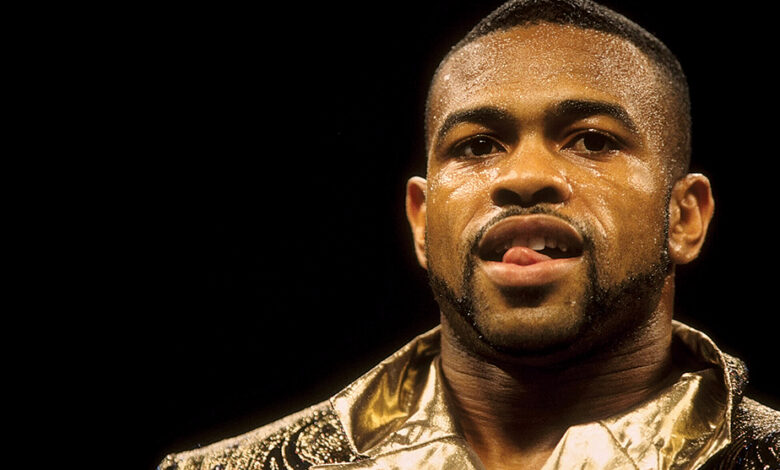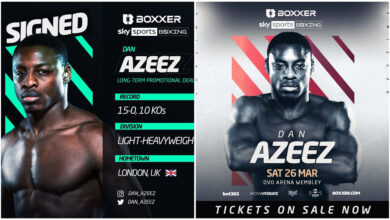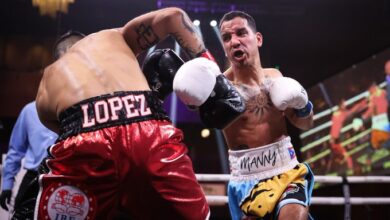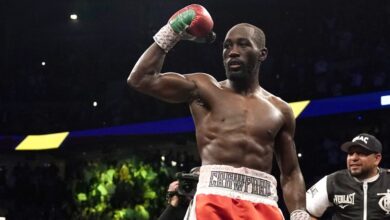Y’all Will Never Forget: Roy Jones was more than simply “gifted”

Roy Jones was inducted into the Hall of Fame this year but his greatness, he insists, had nothing to do with being gifted, writes Tris Dixon
CALL Roy Jones great but don’t ever try telling him he was gifted.
One of the best fighters of all time, Jones hates the ‘gifted’ tag; something he views as a back-handed compliment, or a lazy way of interpreting the amount of work he put into his career.
Jones spent hour after hour, week after week and month after month practising his craft to give him the tools required for his International Boxing Hall of Fame career.
Every moment he spent shadowboxing, firing shots on different trajectories, trying different combinations, moving left, right, back and forward, moving his upper body one way and then the next, the reps would have mounted into the millions to make him look ‘gifted.’
In truth, Jones believes he’s a product of nurture rather than nature. He earned the right to appear as good as he did.
Gifted and talented are two words often associated with the man Jones credits as being the best he faced, James Toney.
Jones defeated Toney widely on points back in 1994, dropping Toney in the third round and outboxing another generational legend.
“People can say what they want to say and say I made it look easy because of the game plan I had but there was nothing easy about that,” Jones explained. “And though it looked easy that was one of the best dudes I ever got in the ring with and I’d say that to anybody. He was a throwback fighter from the old school. That was a time when we weren’t taught to duck and dodge the best, we fought the best head on.”
Jones’s career ran parallel with some of the best of Britain. Around his prime, Jones outclassed Clinton Woods and years later he fought Joe Calzaghe. Yet there was always talk about Jones meeting a Nigel Benn, a Chris Eubank or a Steve Collins.
Ironically, he thinks the win over Toney scuppered many of those marquee match ups, even though he monitored those rivals.
“Of course I did,” Jones said. “I had an eye on fighting those guys, but this is what I later learned… I learned that most of those guys were fearful of James Toney [and] that when I beat James Toney they said, ‘We ain’t fighting James… we definitely ain’t fighting him.’”
It was the winter of 2008 when Jones finally faced Calzaghe. Neither were at their best, neither were in their first flushes of youth, neither were in their primes, and Calzaghe will admit Jones wasn’t what he had been, in particular. But that doesn’t stop Jones from complimenting the brilliant Welshman.
“He is underrated because he is a hell of a volume puncher but when you’re talking about boxers in their primes to be on that pound for pound list you’ve got to have a bit of everything,” Jones went on. “Joe really didn’t have power, he had speed and he had volume and if you’ve got volume, you’re going to beat most older guys. That was his biggest thing. “He’s not overrated because that volume spoke a lot, it kept him undefeated. He may have not had a lot of fights in the United States, and he didn’t have many fights with prime-time fighters in the United States…he beat Jeff Lacy but I fought and beat him [Lacy] at 40 years old, but he [Calzaghe] was definitely a good fighter to do what he did.”
And Jones won’t talk about one Calzaghe without discussing another. He is quick to praise the genius of Enzo Calzaghe, the busking wonderer-turned trainer who took his son to his iconic status in boxing.
But this year has been one of reflection for Jones, not least because of his induction into the International Boxing Hall of Fame.
In a way, Jones wishes he was fighting now in what is tediously-known as the ‘four-belt’ era. Even though at one time he “had seven belts when there were only three,” he would like to have had the opportunity to wear the same tags the likes of Terence Crawford and Oleksandr Usyk have subsequently worn.
But the level of Jones’ accomplishments is rare. When he topped pound-for-pound lists, whoever was second was never even close. He was untouchable. He only lost one fight at his best and that was when he drilled Montell Griffin when Griffin was on the deck and Jones got disqualified, and then he annihilated Griffin in a round in the immediate rematch.
Jones was an awesome force who could do wonderful and exceptional things.
From his first world title win over Bernard Hopkins at middleweight in 1993 to his heavyweight victory over John Ruiz almost exactly a decade later, Jones was unstoppable. He ran out of challengers and so had to find new challenges.
Whether it was playing pro basketball the morning of a fight, trying to knock out an opponent after gifting a free shot by putting his hands behind his back, Jones pushed boundaries.
While making weight was the worst thing, the best was the roar of the crowd and knowing he had given them what they came for.
“I miss most the fans being happy and when they couldn’t wait to see what I was going to do next, and to see what God would bring out of me, because sometimes I didn’t know what God was going to bring out of me,” Jones said. “I was just as excited as they were to see what I was going to do on fight night. Most of the time I didn’t have a clue, but I knew God was going to be there for me.”
Jones is modest by degrees. He knows he’s one of the best to ever do it, but he won’t get caught up in discussions about his greatness. In fact, he hopes all of his achievements are eventually surpassed.
“It’s a very difficult feat,” he said, of doing what he did, winning titles from middleweight to heavyweight and then dropping back down and reigning again at light-heavyweight. “But somebody – like I did – will take something I did and say, ‘That’s my start and now I need to take that to another level.’ We do this because we want to lay cornerstones. Records in track are set every year. We set records and inspire young people to go and break those records, so I set that mark but hopefully someone one day will say, ‘Let me see how I can add to that.’ I don’t know if we’ll see it, but hopefully we will see people try and shoot for it.”

For Jones, he was inspired by Muhammad Ali. There was no harder act to follow but Ali was the marker Jones used to guide his aspirations. When Roy was young, he’d talk about Ali’s greatness and watch his tapes. That was the initial foundation stone Jones used to construct his own house of wonderment.
“Usually our dreams and hopes start somewhere and he provided me that road map to show me where I wanted to go in life,” Roy explained. “And when I met him in 1997, he was a lot older and not in such a great stage of his life but he got in the ring and started shadowboxing with me. The funniest thing happened, I was always taught when you get in the ring you’ve got to be first. And as old as Ali was, he still got in front of me. He was still sharp enough to get in front of me in a boxing ring.”
But in Roy’s amateur days, he learned other aspects of the sport. Ali was, of course, a balletic star who could slug, move, outthink, disarm and outbox just about anybody.
Jones, on the other hand, came through the ranks with a Detroit destroyer called Gerald McClellan and the two were friends.
McClellan was left with life-changing injuries following a gruelling 1995 war with Benn in London, and many saw Jones psychologically scarred from what happened to his former amateur rival.
“Gerald was one of the best professional boxers that people don’t understand about,” Jones said. “His power was out of this world. If you think about it, ‘The Hawk’ [Julian Jackson] is the best puncher ever from out of the middleweight boxers, and he [McClellan] was able to beat the Hawk twice, so that tells you how good he was.”
Would Jones and McClellan have crossed paths in the pros, in spite of their friendship?
“If that tragedy hadn’t happened, of course we would have fought,” Roy replied. “Because we were on a head-on collision and I guarantee we would have fought. We fought in the amateurs, he got a 3-2 split decision, I thought I won. I thought it was political but that’s what happened. He’s a great fighter though, much better than people give him credit for and I know had he stayed healthy we would have definitely had a collision, without question.”
McClellan didn’t have a choice on when to call it a day after the Benn fight, but Roy continued to roll the dice while clearly a declining fighter. For some, it probably altered how they interpreted his legacy but he was never going to bow out just because others wanted him to.
“You don’t tell me to stop, I’m going to go,” he said, discussing the fights that came well after his prime years. “In football, the whistle blows, and then you stop. In every sport, you go until the whistle blows. I wasn’t taught that. I don’t walk away. I won’t stop until the referee tells me to stop.”
He boxed an exhibition with Mike Tyson a couple of years ago and the two nearly fought after Jones historically toppled Ruiz, but through it all Jones became one of the top boxing broadcasters, learning his trade alongside the wonderful HBO team that featured Jim Lampley, Max Kellerman and Larry Merchant. Jones was full of effusive praise for Lampley in particular.
“It was one of the best teams ever because we bought the best out of one another,” Roy said, of the HBO unit that provided the soundtrack to a generation of enormous fights. “I was an expert about boxing and they were experts about what they did and I’ve never seen a guy like Jim Lampley who can read a whole page and can almost recite that page word for word after reading it one time. That’s God-given talent. That’s a person who’s found his lane in life. Larry Merchant, I love. Max Kellerman, I love, because they know what they are supposed to know about boxing but Jim Lampley is a special talent. I’ve never in my life seen a guy with the memory that he has.”
But don’t say the same thing of Jones and his talent. When he started out, he had no idea he’d become the world light-heavyweight champion, let alone that someday he’d wear the WBA heavyweight title.
It was returning back to 175 after his glorious, nose-busting foray against Ruiz when the real problems came. Having packed on the weight, it was a far more difficult task than Jones envisaged stripping the rippling bulk back, and that was the most-gruelling lesson he learned.
There were wins afterwards, but the Jones magic dust had been drained from his legs, his gloves and his chin.
“When I lost 25lbs of muscle, to go down to light-heavyweight, I thought I could do it, but I had grown,” Jones lamented. “I learned when you go up, don’t try to come back down because coming down ain’t the same as going up. All my life I’d cut to make weight but after it got too hard, I’d move up. One time I went down [in weight] as an amateur and it didn’t work out for me, and I should have known from there not to go back.”
Alas, a drawn and sunken Jones began to unravel in major fights and the egg timer on his career was turned upside down.
There were still big fights. He knew faded former welterweight (147lbs) Felix Trinidad wouldn’t carry his power up to 170lbs for their 2008 showcase at the Garden, which Jones won via wide decision, and the old Jones then lost to Calzaghe before beating Calzaghe-victims Omar Sheika and Jeff Lacy.
Jones was 66-9 (47) when it was all said and done although Mr Untouchable had been touched too many times by the end, history had been made. Jones, who turns 54 in January, was inducted into the International Boxing Hall of Fame this year and on reflection, said: “The journey turned out exactly the way we wanted to.”
Jones thanked his wife, Natlyn, for being with him through it all as he accepted his Hall of Fame ring. He thanked his father, Roy Snr, with whom he’d had so many issues – bitter and sweet, though mostly the former – over the years, and he thanked Muhammad Ali for the inspiration.
“In this game of boxing, we are different but we’ve got to have a hell of a woman at home to leave us with a sound mind to be able to go through training camp and fight like we do and my wife has been there every day of my life,” Jones said.
Then, as the lights dimmed and with microphone in hand, Jones said, “I came into this thing entertaining ya’ll, and I’m about to leave entertaining ya’ll.”
Roy rapped one of his songs, Y’all Must Have Forgot, to the delight of the Hall of Fame crowds, but the truth is, it didn’t need a song to remind anyone about what he did or who he was. For many long-time observers, Roy Jones was simply the best fighting machine they had ever laid eyes on. He was one of the great ones. Just don’t call him gifted.





